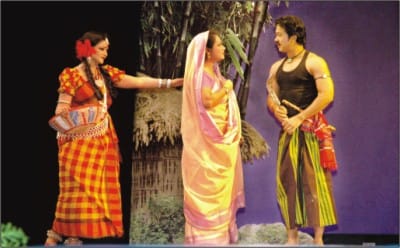Palli-kobi Jasimuddin Festival begins
"Nakshi Kanthar Math" staged
Ershad Kamol
The narratives of the rustic Bengal and its people have always been presented artistically in Palli-kobi Jasimuddin's poetry, touching the soul of readers. To pay homage to the poet, Department of Production of Bangladesh Shilpakala Academy (BSA) has arranged a three-day programme at the National Theatre Stage. Secretary of the academy, Ashraful Musaddeq inaugurated the programme on June 3. Media personality Muhammad Jahangir, also the coordinator of dance troupe Nrityanchal, was the special guest. Director, Department of Production, Zinnat Barkatullah delivered the welcome speech. Muhammad Jahangir said, "Besides academic curriculum at school and college levels, Jasimuddin's works do not get the exposure they deserve. While most of the 20th century Bengali poets are highly influenced by Rabindranath Tagore, Jasimuddin is one of the few who have developed their distinct styles. I believe that by labelling the poet 'Palli-kobi', the urban literature enthusiasts have 'subconsciously' sidelined his creativity. I appreciate the current endeavour of the academy and expect more such elaborate programmes in future." Ashraful Mosaddeq said, "If a poet doesn't offer any new 'form' or 'idea', he/she can never survive the test of time. Jasimuddin is successful in presenting our rural culture in a modern light. To promote his work we will take more initiatives." After the discussion, Nrityanchal staged a dance-drama titled Nakshi Kanthar Math, based on Jasimuddin's popular narrative poem with the same title. Under the guidance of Zinnat Barkatullah, the troupe revived the show, which was premiered in 1981. Zinnat Barkatullah informed, "In 1981, BSA sent Nakshi Kanthar Math to Italy. Shibly Mohammed, Shamim Ara Nipa and I were the lead performers in the dance-drama. The poem is dramatised by Golam Mujtaba and the dance-drama is directed by Mostafa Manowar. Veteran dancer GA Mannan is the choreographer and Ustad Khadem Hossain Khan is the music composer. Indramohan Rajbongshi and Nina Hamid render the playback for the tunes. Tonight's show maintains the same presentation style of the premier performance." Featuring the tragic love story between Shaju and Rupai, portrayal of rural Bangladesh -- traditions, struggles and way of living as a whole -- is presented eloquently in Nakshi Kanthar Math. The dance-drama begins with a drought scene. The villagers arrange a socio-religious ritual praying for rain. At the event Rupai (Shibly Mohammed) meets Shaju (Shamim Ara Nipa); it's a classic case of love at first sight. The lovers get married but the bliss does not last long. Tragedy occurs when thugs come to loot the crops of the villagers, resulting in a conflict. Five die and Rupai is wrongly accused. To evade the situation, he sees no other way but to flee. Rural customs and festivities like harvest, fishing and wedding, have been emphasised, rather than focusing on just the love-story. The dramatisation of solitude by Shibly and Nipa deserve a special mention. Nipa embodied the melancholy of the character Shaju, who pines away for her beloved and succumbs to death. The story ends with Shibly as Rupai, delivering a remarkable performance when the character returns home and finds a nakshi kantha (embroidered quilt), in which Shaju had delineated moments from her lonesome life.
|

(L-R) Shamim Ara Nipa, Zinnat Barkatullah and Shibly Mohammed in a scene from Nakshi Kanthar Math. PHOTO: STAR |